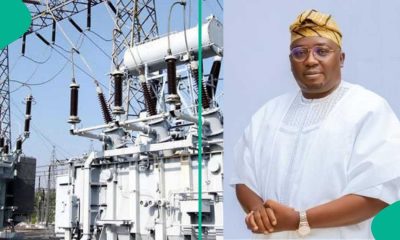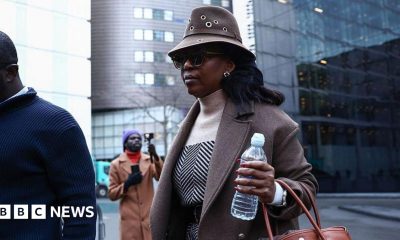Comments and Issues
Lessons from the British elections
Published
2 years agoon
By
Reuben Abati
This year, 2024 is clearly the year of democratic elections, the. year that democracy is put to the test in virtually every continent of the world – at least 97 elections worldwide and so far, we have witnessed and reported some of the significant ones – India, the world’s most populous country which ran an election for 44 days, with over one million voters, Indonesia, Israel, Kuwait, Mexico, Russia, Iran, European Parliament, Brazil, Pakistan, Bangladesh, France, Britain, and here in Africa, we have Senegal, South Africa, Togo, Tunisia, Rwanda, Ghana, Guinea Bissau, Mauritius, Mauritania, Namibia; in the Americas – Jamaica, Dominican Republic, Brazil, Belize, Canada, Chile, Costa Rica, Venezuela, Uruguay, United States. We also have – Finland, South Korea, Thailand, Austria, Cyprus, Czech Republic, Turkey, Poland, Belgium, Georgia, Hungary, Finland, Italy, Iceland, Moldova, North Macedonia, Poland, Portugal, Tuvalu, Solomon Islands, and so on and so forth.
Nigeria held its own general elections in 2023, producing President Bola Ahmed Tinubu as winner.
For reasons owing to consanguinity or proximity, or shared historical affinity, or simply comparison, Nigerians have found themselves having to compare their own experience of democratic rule – 25 years of unbroken democratic rule since 1999 and the general elections in Nigeria in 2023. Most of the comparisons to put the matter in context, are with Senegal, South Africa, and now Britain, where a new Prime Minister, Labour party leader, Sir Keir Starmer has assumed office and power, and the Conservatives have packed out of Downing Street. The reference to Britain is understandable: Britain used to be Nigeria’s colonial master, Everything Nigerian is linked to Britain, our common law heritage, history, culture, including the artefacts that the British stole from our people.
For more than two centuries, Nigeria and Britain have been linked almost umbilically. There is hardly any family or community in Nigeria that does not have any relative, immediate or distant, in the United Kingdom. In the just concluded election in the UK, there was even a Yoruba Political Party, with a Dr. Olusola Oni running for MP from Peckham on July 4. A total of 30 persons of Nigerian descent who may identify as British-Nigerian made a bid to be in the British parliament. In the end about six of them won election into parliament including Chi Onwurah (Labour MP for Newcastle Central and West), Kemi Badenoch (re- elected as Conservative MP from Saffron Walden and the past immediate Business Secretary), Kate Osamor (Labour MP from Edmonton and Winchmore Hill since 2019, now re-elected); Florence Eshalomi (Labour MP since 2019, now representing Vauxhall and Camberwell Green, Taiwo Owatemi (Labour MP from Coventry West), and Bayo Alaba (MP, Southend East and Rochford). These Nigerians in Diaspora are not alone, there are many others serving as Councillors, or Mayors, not just in Britain, but across Europe and as far as Canada, the United States and Australia.

Those who are not in politics, are doing well in sports or business and other professions, all linked to their motherland by blood and ancestry, and legitimately, we are proud of them. What is proven is that “Nigeria no dey carry last” and the ones who project us brilliantly like Bukayo Saka and Kemi Badenoch deserve to be celebrated, for showing that although Nigerians these days talk about the “Japa syndrome”, the Nigerian DNA has excellence in its imprints.
However, the temptation to review the British election, and compare it has been strong and compelling. Whereas it can be said that the British democracy is one of the oldest in the world dating back to the Magna Carta, in 1215, the creation of the British Parliament in 1707, the Reform Act of 1832, the Representation of the People Act of 1918, and the UK General Election of 1950 pointing to a long history and tradition, with tested institutions, democracy in Nigeria has been relatively new, but the key argument about the government of the people for the people and by the people is that democracy is a symbol, a standard and a system of politics which does not require a reinvention of the wheel. Democracy in modern times is certainly not about the Age of Methuselah, but the values that each country presents as its own standards.
This therefore explains some of the observations that Nigerians have made, by way of public education, and self-derision perhaps, about the 2024 UK elections. The July 4 general elections in the UK has been two years in the making with people predicting that the way the Conservatives were carrying on, they were bound to lose the next general elections to Labour, even if no one could predict the exact date until some gamblers around the Rishi Sunak circle and the Conservative party were found to have placed bets on July 4, and as it turned out former Prime Minister Rishi Sunak announced July 4. The furore over the gambling over the date spoke to the moral content of British politics.
In the course of the campaigns, the debate was about issues that are of interest to the British people: immigration, taxation, housing, public spending, NHS, Brexit and the EU. The character of the front-runners was clear. Starmer is pro-business, pro-reforms, pro-EU. He promised to drive economic growth, invest in green energy, overhaul the NHS, create safer streets, and deliver opportunity through a new skills agenda. The Tories had been in power for 14 years, with five Prime Ministers – David Cameron (2010 – 2016), Theresa May (2016 – 2019), Boris Johnson (2019 – 2022), Rishi Sunak (2022- 2024) with the most disastrous of them being Liz Truss who was PM for a historically short period of 49 days. The Tories presided over austerity, Brexit, the pandemic and high inflation. The people got tired of them and this was reflected in the various Polls – YouGov and Ipsos ahead of July 4, indicating that the British people wanted change. They were tired of the chaos that the Conservatives had introduced into public life.
The party itself was divided down the middle with many key members defecting either to Labour or to Nigel Farage’s Reform UK. It was certain that the Conservatives were on their way out, and that was exactly what happened, the party’s worst result in its 190-year history was announced on July 5. It wasn’t exactly a wipe out, but the scale of the landslide that the Labour party recorded was their best performance since Tony Blair entered Downing Street in 1997, and the Tory’s worst performance in recent history.
The character of the election race and the outcome is remarkably different from what we have seen in Nigeria and what obtains in the United States which goes to the polls on November 5. The UK election was for six weeks. There was no time to waste. In the United States, the race can take up to two years of campaign. In Nigeria, so much time is taken up by the time table of the Independent National Electoral Commission, voter registration, voters register, delineation of wards and polling unit. In the UK, nobody heard of the Chairman of the Electoral Commission and there was no debate over polling units or wards.
The British did not have to borrow and sell property to raise funds for political campaigns. Political advertising on radio and TV is restricted, and the spending limits on advertisement are strictly controlled. The American election is a bit more elaborate and expensive, but not the British. Even at the height of the campaign in the UK, with Rishi Sunak being pushed by his allies to launch personal attacks on Keir Starmer and Nigel Farage, still there were no absurd diversions into personality attacks, insults and culture wars. If Rishi Sunak had been a candidate in a Nigerian election, he would have been told stories about how he came to England and how he is able to make it in life because he is married to a rich man’s daughter!
There were no professional spokespersons fighting proxy wars in the media and claiming to know everything about almost everything. The British do not do God. There were no clerics offering predictions about who the eventual winner would be. The candidates were not going about proclaiming “God bless Britain”. There was no attempt to bribe God.
In Nigeria, election time is boon season for clerics who distort the process with all kinds of dreams and visions, and shamanists who perform rituals and place sacrificial offerings at crossroads. Age was not an issue in the UK either. Sunak is 44. Starmer is 61. Age is a big issue in the forthcoming US elections but in the UK, the youngest candidate and elected Labour MP from Northwest Cambridgeshire is a certain Sam Carling, a 22-year-old Science graduate of Cambridge University – the first MP in British history to be born in the 21st Century. He defeated Shailesh Vara with 39 votes. Vara had been in the Commons since 2005. Carling is now “Baby of the House” but the very confident Carling says his age is not an issue- he had been a Councillor before now and he knows his example will inspire other young people, but he wants to get on with the job. He has ideas he wants to pursue in parliament. I laugh in original vernacular. In Nigeria, he would not even have been allowed to buy a nomination form. He would have been advised to go and play with his mates.
On election day, voting started at 7am and ended the same day at 10pm. By the following morning, all the votes had been counted and the result was in the public domain with Labour winning 412 seats, Conservatives – 121 (much better than the 61 that had been predicted; Lib Dems –72, Reform UK – 5 (a big gain for the Nigel Farage-led party), Scottish National Party -9, Plaid Cymru – 4; Green – 4: more or less a strong showing by the smaller parties. By Friday, July 5, Rishi Sunak tendered his resignation. Starmer was invited to Buckingham Palace and asked to form the new government and by evening a Cabinet had been announced. Such a smooth, seamless transition is not possible in Nigeria. On election day in the UK, there was no such thing as the late arrival of voting materials. There were no BVAS machines or stories about technical glitches. No thugs on the streets. 49 million voters, 650 constituencies, turn-out of 60% and yet no policemen or soldiers at polling stations.
No stories that touched the heart about voters’ cards: to vote in the UK, you only need a photo ID showing that you are of age. Nobody has gone to court to challenge the results. Even the persons who lost their seats in parliament like former Prime Minister Liz Truss, Jacob Rees-Mogg, Grant Shapps, Gillian Keegan and Penny Mordaunt – 175 Tory MPs- have accepted their loss in good faith. There has been no post-election throwing of tantrums in the UK because the institutions function, and the people understand what it means to live in an organized society. Nobody has had to wait for months before a cabinet would be announced.
The very day that Keir Starmer assumed office, work started; what we have seen is a clockwork relay race, indicating the efficiency of the British model. For the first time in British history, a woman – Rachel Reeves is Chancellor of the Exchequer. There are other high profile women in the cabinet as well: Angela Rayner is the new Deputy Prime Minister and Secretary for Levelling Up, Housing and communities. Yvette Cooper is Home Secretary. Lisa Nandy – Secretary of State for Culture, Media and Sport. Pat McFadden is Chancellor of the Duchy of Lancaster. In all, a total of 11 women Ministers. It is the most gender-balanced cabinet in UK history, relatively youthful and experienced but largely White. There has been no quarrel over the appointments. Nobody has protested that his or her constituency has not been represented. There have been no thanksgiving services in churches or notices to that effect nor has anyone placed congratulatory adverts in the media. We have not heard that the King or his sons had a hand in the appointment of Ministers.
After every election season in Nigeria, we tend to spend months agonising over the outcome of the elections, with politicians and their lawyers seeking to win the election at the courts of law. Nobody trusts the process; every politician becomes an emergency lawyer. Our democracy is significantly court-determined.
But what we have seen in Senegal, South Africa, India. Iran, Britain, and even just over the weekend, in France, is that it is possible for democracy to work. Some commentators have suggested that in seeking a solution to the contradictions in the Nigerian system, there should be electoral reform every cycle, but it would appear that the problem is not the complexity of the democratic process itself but the underdeveloped nature of Nigeria’s political machinery and the character of the people themselves. Democracy is seen as a form of coronation in Nigeria which grants access to public resources and other privileges. This is why when our leaders get to power, they seem to be more interested in exotic vehicles, choice accommodation, yachts, brand new aircraft, chieftaincy titles and fat security votes.
Last Friday, Sir Keir Starmer, the 58th Prime Minister of the UK, promised the people of the United Kingdom that he will lead a “government of service” on a mission of national renewal. Times will tell as they say, but whatever happens the British desired change, they have voted for it and now, they have it. In Nigeria, one year after the general elections, Nigerians are still wondering what happened to their country.
Trending

 Health1 week ago
Health1 week agoFOI data show thousands of heart failures reports linked to AstraZeneca COVID-19 vaccine

 News1 week ago
News1 week agoTinubu approves purchase of 2 new satellites to strengthen Nigeria’s digital infrastructure

 Trends2 days ago
Trends2 days agoTonto Dikeh reunites son with Churchill after decade-long split

 Latest23 hours ago
Latest23 hours agoYoruba film industry mourns as popular actress aunty Ajara passes away

 Health1 week ago
Health1 week agoInvestigation uncovers industrial-scale counterfeit hub in Lagos’ Ojo Barracks

 Business1 week ago
Business1 week agoDeeper issues behind Nigeria’s repeated grid collapses —Experts

 Crime7 days ago
Crime7 days agoUK Court hears digital, financial evidence in Diezani Alison-Madueke corruption trial

 Crime1 week ago
Crime1 week agoArmy busts human trafficking ring, rescues day-old baby listed for ₦3m



